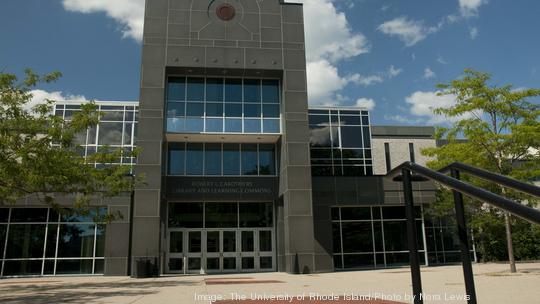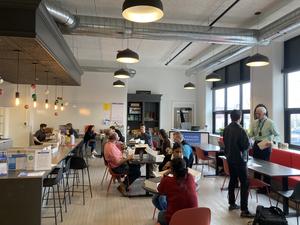
For 30 years, DataSpark has assisted policymakers in state and local governments, community leaders in nonprofits and academic researchers across the country, but most notably at home in Rhode Island. Now, the state's largest data warehouse is taking a look at the phenomenon of "brain drain" across a number of East Coast states.
Data Spark will be teaming up with New Jersey and Virginia to create the multi-state postsecondary report for New England and the Mid-Atlantic, Director Dana Brandt said. The effort is being funded by the Coleridge Initiative's Democratizing Our Data Challenge and plans to securely link education and employment records cross-state and “explore to what extent postsecondary graduates work out-of-state following graduation.”
DataSparkis located at the Robert L. Carothers Library & Learning Commons at the University of Rhode Island and operates and maintains Rhode Island’s statewide longitudinal data system (SLDS), also known as the RI DataHUB. That system links individual-level data from early childhood through time in the workforce.
Brandt said this new initiative marks the first time DataSpark is sharing and analyzing data across state lines. She said the “brain drain” has long been a topic of interest and a concern of policymakers, economic development officials and business leaders and entrepreneurs in Rhode Island and elsewhere across the nation.
“Without the data to explore outcomes of those who leave the state, it is difficult to counter this narrative and the associated policy decision,” Brandt said. “Given the number of colleges and universities and the pull of high-paying opportunities in nearby cities, Rhode Island policymakers, especially, have been concerned about this drain. Interestingly, a 2019 report from the U.S. Joint Economic Committee found that Rhode Island experiences gross brain drain but net brain gain, replacing highly educated adults born in state with equally well-educated adults born out of state.”
Brandt said this new project will help add detail to that finding while digging deeper into educational and employment outcomes of students by state of residence, major, degree and industry.
“In particular, we hope to identify who is most likely to enter Rhode Island for college as well as who is most likely to remain in Rhode Island for work,” he said. “We hope to identify what fields of study and sectors of employment draw people into our state and pull residents across our borders.”
The new data set, she said, could help Rhode Island leaders can better align educational and workforce programs and policies with regional demand.
“For instance, policymakers can prioritize investments in programs focused on high-wage, high-demand occupations. Students, families, school counselors will also be able to leverage the final dashboard to better understand potential educational opportunities and career outcomes,” Brandt explained.
One of the cornerstones of DataSpark’s work is that data should inform policymaking, Brandt said, and over the company’s 30 year in existence it has helped lawmakers address issues such as lead exposure, asbestos exposure, early intervention at school and various housing problems facing low incoming residents.
Earlier this year, Rhode Island’s Executive Office of Health and Human Services commissioned DataSpark to analyze and share results on Rhode Island’s health care graduates and their employment outcomes at the Healthcare Workforce Summit. Using the RI SLDS, they found that more than three-quarters of Rhode Island’s healthcare graduates who entered the health care workforce remained employed in that workforce one year later.
Brandt said the "brain drain" project got its start in discussions at the Eastern States Longitudinal Data Collaborative. Through this Collaborative, states prioritize research which would benefit from cross-state data sharing, she said.
“It also provides fruitful ground for an initial collaboration because the eastern states can build off successes and lessons learned from Kentucky and Ohio’s Multi-State Postsecondary Report,” she added.








